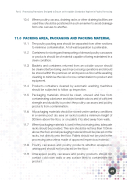Part 2 | Processing Procedures Designed to Ensure an Acceptable Standard of Hygiene in Poultry Processing 10.4 Where poultry carcass, draining racks or other draining facilities are used they should be positioned in such a manner to avoid drainage from one carcass to another. 11.0 PACKING AREA, PACKAGING AND PACKING MATERIAL 11.1 The poultry packing area should be separated from other sections to minimise contamination. A full wall separation is preferable. 11.2 Containers for storing and transporting of dressed poultry carcasses or products should be of material capable of being maintained in a clean condition. 11.3 Baskets and containers returned from an outside source should be cleaned before being used in processing operations and should be stored within the premises on an impervious oor while awaiting cleaning to minimise the risk of cross contamination to product and equipment. 11.4 Products containers cleaned by automatic washing machines should be subjected to follow up inspection. 11.5 Packaging materials should be clean, unused and free from contaminating substance and objectionable odours and of suf cient strength and durability to protect the poultry carcasses and poultry products from contamination. 11.6 All packaging materials should be stored under sanitary conditions in a vermin proof dry area on racks located a minimum height of 300mm above the oor, or on pallets if located away from walls. 11.7 Where packaging materials is used in the processing area, adequate racks should be provided. The rack should be not less than 100mm above the oor and all packaging material should be placed on the racks, not directly onto the oor. Pallets should not be used in the processing area unless made of approved impervious material. 11.8 Poultry carcasses and poultry products whether wrapped or unwrapped should not be placed on the oor. 11.9 Unwrapped poultry carcasses and poultry products should not contact cold room walls or any surface likely to contaminate the product. 49
